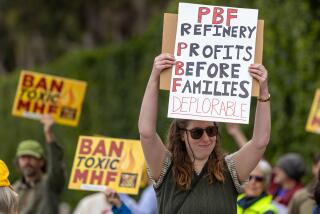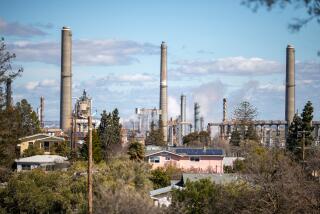Wide Gap Divides Mobil, Torrance on Adviser Choice : Safety: Selection of a refinery watchdog will be left to a court-appointed overseer if the two sides can’t agree.
- Share via
The city of Torrance and Mobil Oil Corp. vehemently disagree about which of two firms is best qualified to oversee safety issues at Mobil’s Torrance refinery, accord ing to sharply worded legal briefs filed by the two sides.
The briefs, filed last Friday in preparation for an April 10 court hearing, offer a glimpse of the contrasting approaches taken by the city and the oil giant in designing the new job of court-supervised safety adviser. The job is a central element of the October, 1990, consent decree that settled the city’s public nuisance lawsuit against Mobil.
The city has nominated SRI International of Menlo Park for the post, but Mobil prefers a unit of Westinghouse Electric Corp. of Pittsburgh. If the city and Mobil fail to agree on a firm, the decision will be made by retired Superior Court Judge Harry V. Peetris, who is overseeing the decree.
The brief written by Torrance’s attorneys touts the skills of SRI International and criticizes Westinghouse’s proposal as too narrow and lacking in a comprehensive methodology. The city’s brief says Westinghouse appears to believe that it would be “just another consultant” rather than an officer of the court.
And Westinghouse has not agreed to a city request that it forgo any contracts with Mobil during the time it would serve as safety adviser, the city brief states.
A Westinghouse spokesman in Pittsburgh, Michael Stock, said Wednesday that “business with Mobil makes up a very small percentage of Westinghouse total sales in any given year,” but that Westinghouse generally does not make the sort of agreement Torrance is seeking.
The city also questions the management and safety record of a Westinghouse subsidiary that manages a problem-plagued government nuclear facility near Richland, Wash.
Mobil’s attorneys argue in their brief that Westinghouse is far better versed in refinery safety issues than SRI International.
And although the city maintains that Westinghouse’s approach is not comprehensive enough, Mobil dismisses SRI International’s proposal as too vague, open-ended and potentially costly.
“It was clearly understood by the parties in negotiating the Decree that the Safety Adviser would not be given an open-ended charter to contemplate the refinery and then to theorize about what should be done, . . . “ the Mobil brief states. “The Safety Adviser should not be in a position where, in effect, it can reopen those negotiations.”
The city and Mobil can file rebuttals to the briefs by April 2.
“We still believe that Westinghouse is the best choice and the most qualified,” Mobil spokesman James A. Carbonetti said Wednesday.
But Michael R. Leslie, an attorney for the city, said Torrance officials are standing firm.
“We remain convinced, after reading Mobil’s brief, that SRI is the best candidate. This is obviously something the judge is going to have to decide,” Leslie said.
Torrance filed suit against Mobil in April, 1989, after a series of accidents at the refinery. The two parties signed the wide-ranging decree just weeks before the suit was to go to trial.
In the decree, Mobil agreed to phase out its use of highly toxic hydrofluoric acid by the end of 1997 unless it can develop a safer form of the chemical by the end of 1994.
The decree also called for an independent adviser with the authority to investigate safety issues at the refinery. The adviser will have to approve any modified use of hydrofluoric acid.
In its brief, Mobil criticizes the SRI proposal for what it calls “the near-total absence of any discussion of expertise in refinery process systems safety.”
The firm chosen as safety adviser must be staffed with registered professional engineers, certified safety professionals and certified industrial hygienists, Mobil argues. “Persons with these qualifications are dismayingly absent from SRI’s proposed team; instead, SRI has fielded a group of business consultants and academics,” the Mobil brief says.
Mobil also chides SRI for its overall approach, adding that SRI officials said in interviews that it could take up to two years to develop a work plan.
“This is intolerable to Mobil, and ought to be intolerable to the people of Torrance,” Mobil’s attorneys wrote.
The SRI proposal consists of a four-phase plan, with the first phase alone costing from $325,000 to more than $1 million. SRI declined to give specific estimates for the total cost of the project, saying that too many uncertainties remain.
Mobil’s lawyers criticize what they call the open-ended nature of the SRI proposal. Based on the cost of the first phase, Mobil says, “one could reasonably conclude that the cost will be astronomical.”
The decree calls for Mobil to pay the costs of the safety adviser.
The Westinghouse proposal estimates a total bill of $350,000, a figure the city criticizes as unrealistically low.
The city’s brief says the Westinghouse proposal budgets “a mere $15,000 to do two reports evaluating any alternative (hydrofluoric acid) catalyst.” The brief argues that to properly evaluate “such an unproven and potentially innovative technology, far more will be required than the cursory review of a few Mobil documents and the drafting of two $7,500 reports to the Court.”
The city brief also takes aim at what it calls “Westinghouse’s poor record in managing its own facility” in Washington.
The Westinghouse Hanford Co., a subsidiary of Westinghouse Electric Corp., is the primary operations and engineering contractor for the federally owned Hanford complex, a former production site for nuclear weapons materials, said Stock at Westinghouse headquarters in Pittsburgh.
The brief quotes extensively from U.S. Department of Energy reports about Westinghouse’s performance at Hanford. Although Westinghouse in late 1990 received an overall good rating from the energy department, the agency reduced the fee paid to the company.
An energy department letter to the Westinghouse Hanford Co. says the department is lowering the fee “because WHC has not demonstrated the degree of leadership, ownership, and proactive management which was required during the award fee period and which will continue to be required to deal with the challenges of the Hanford mission.”
The letter recommends improvements in quality control and quality assurance as well as more attention to tank farm safety.
The Westinghouse unit that would oversee the Torrance refinery is separate from the subsidiary that operates the Hanford site, the city concedes.
Even so, it adds, “the Hanford situation will undermine public confidence in Westinghouse’s neutrality and ability to find solutions to problems at the Mobil Refinery.”
More to Read
Inside the business of entertainment
The Wide Shot brings you news, analysis and insights on everything from streaming wars to production — and what it all means for the future.
You may occasionally receive promotional content from the Los Angeles Times.










